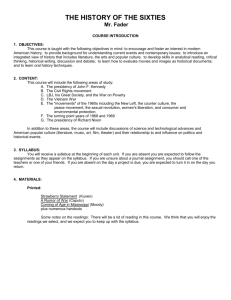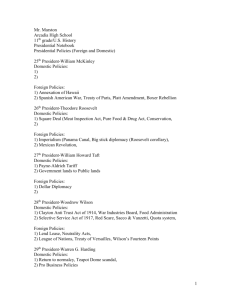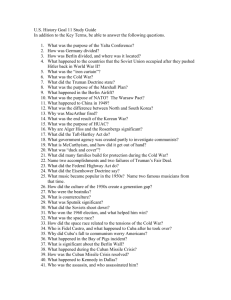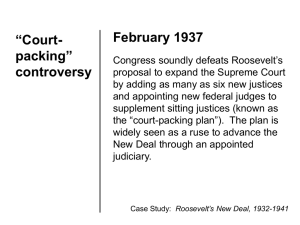sylibusHST202.doc
advertisement
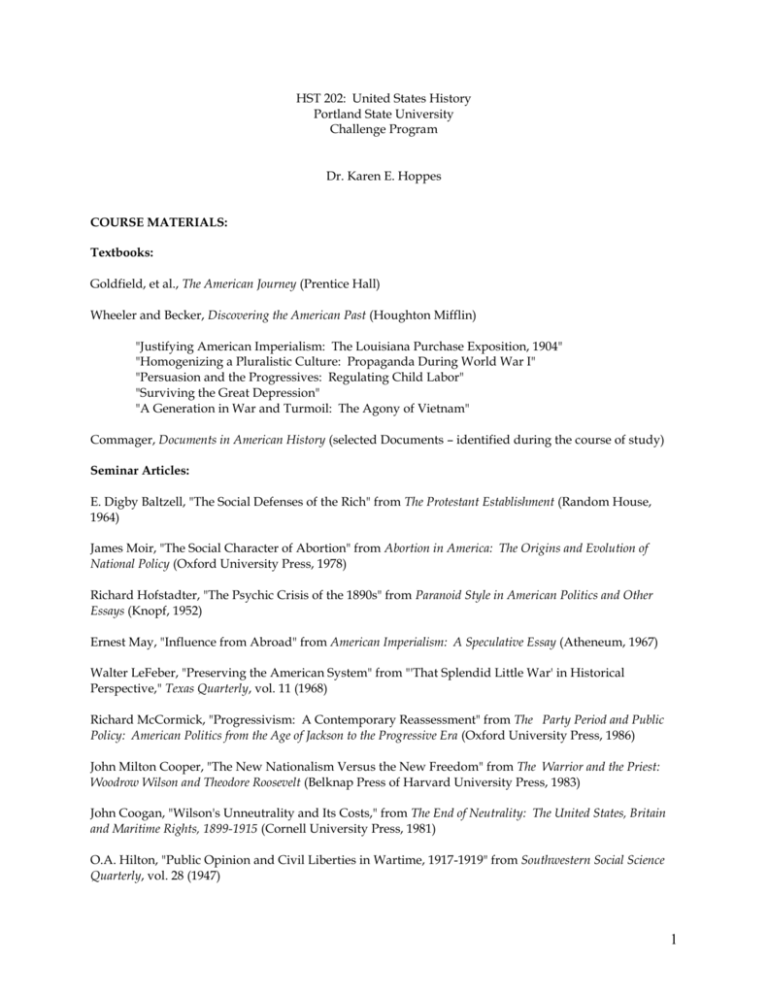
HST 202: United States History Portland State University Challenge Program Dr. Karen E. Hoppes COURSE MATERIALS: Textbooks: Goldfield, et al., The American Journey (Prentice Hall) Wheeler and Becker, Discovering the American Past (Houghton Mifflin) "Justifying American Imperialism: The Louisiana Purchase Exposition, 1904" "Homogenizing a Pluralistic Culture: Propaganda During World War I" "Persuasion and the Progressives: Regulating Child Labor" "Surviving the Great Depression" "A Generation in War and Turmoil: The Agony of Vietnam" Commager, Documents in American History (selected Documents – identified during the course of study) Seminar Articles: E. Digby Baltzell, "The Social Defenses of the Rich" from The Protestant Establishment (Random House, 1964) James Moir, "The Social Character of Abortion" from Abortion in America: The Origins and Evolution of National Policy (Oxford University Press, 1978) Richard Hofstadter, "The Psychic Crisis of the 1890s" from Paranoid Style in American Politics and Other Essays (Knopf, 1952) Ernest May, "Influence from Abroad" from American Imperialism: A Speculative Essay (Atheneum, 1967) Walter LeFeber, "Preserving the American System" from "'That Splendid Little War' in Historical Perspective," Texas Quarterly, vol. 11 (1968) Richard McCormick, "Progressivism: A Contemporary Reassessment" from The Party Period and Public Policy: American Politics from the Age of Jackson to the Progressive Era (Oxford University Press, 1986) John Milton Cooper, "The New Nationalism Versus the New Freedom" from The Warrior and the Priest: Woodrow Wilson and Theodore Roosevelt (Belknap Press of Harvard University Press, 1983) John Coogan, "Wilson's Unneutrality and Its Costs," from The End of Neutrality: The United States, Britain and Maritime Rights, 1899-1915 (Cornell University Press, 1981) O.A. Hilton, "Public Opinion and Civil Liberties in Wartime, 1917-1919" from Southwestern Social Science Quarterly, vol. 28 (1947) 1 Frederick Lewis Allen, "Revolution in Manners and Morals" from Only Yesterday (Harper and Row, 1931) David Horowitz, "Social Morality and Personal Revitalization: Oregon's Ku Klux Klan in the 1920s" from Oregon Historical Quarterly (Winter 1989) William Leuchtenburg, "The Achievement of the New Deal" from Fifty Years Later: The New Deal Evaluated, Harvard Sitkoff, ed. (Knopf, 1985) Barton Bernstein, "The New Deal: The Conservative Achievements of Liberal Reform" from Towards a New Past: Dissenting Essays in American History (Random House, 1968) Robert Divine, "Roosevelt the Isolationist" from Roosevelt and World War II (Johns Hopkins University Press, 1969) Robert Dallek, "Roosevelt's Leadership, Public Opinion, and Playing for Time in Asia" from Franklin D. Roosevelt and American Foreign Policy, 1932-1945 (Oxford University Press, 1979) Jonathan Utley, "Roosevelt's Failure of Leadership, Bureaucracy, and War with Japan" from Going to War with Japan, 1937-1941 (University of Tennessee Press, 1984) Herbert Feis, "Shortening the War and Saving Lives," from The Atomic Bomb and the End of World War II (Princeton University Press, 1989 renewed) Martin J. Sherwin, "The Bomb as a Weapon of Diplomacy," from A World Destroyed: The Atomic Bomb and the Grand Alliance (Knopf, 1975) Arthur Schlesinger, Jr., "Origins of the Cold War" from "Origins of the Cold War," Foreign Affairs, vol. 46 (October 1967) Martin Sherwin, "The Atomic Bomb and the Origins of the Cold War," from "The Atomic Bomb and the Origins of the Cold War," American Historical Review, vol. 78 (1978) Joyce and Gabriel Kolko, "Making the World Safe for American Capitalism," from Limits of Power: The World and United States Foreign Policy, 1945-1954 (Harper/Collins, 1972) Melvyn Leffler, "The Truman Doctrine and the Rise of American Globalism," from "From the Truman Doctrine to the Carter Doctrine: Lessons and Dilemmas of the Cold War," Diplomatic History, vol. 7, no. 4 (1983) Arthur Schlesinger, Jr., "The Kennedy's and Cuba: The Ultimate Triumph of Diplomacy," from Robert Kennedy and his Times (Houghton Mifflin, 1978) Thomas Patterson, "Kennedy's Fixation with Cuba," from Kennedy's Quest for Victory: American Foreign Policy, 1961-1963 (Oxford University Press, 1989) Vincent Gordon Harding, "King as Disturber of the Peace," from "Beyond Amnesia: Martin Luther King, Jr., and the Future of America," Journal of American History, vol. 74 (September 1987) William Chafe, "The African American Struggle as an Unfinished Revolution," from "The End of One Struggle, the Beginning of Another," The Civil Rights Movement in America, Charles W. Eagles, ed. (University Press of Mississippi, 1986) 2 J. Skelly Wright, "The Morality of Affirmative Action," from "Color Blind Theories and Color Conscious Remedies," The University of Chicago Law Review, vol. 47 (1980) John McAlister, Jr., "Vietnam: A Historical Overview" from Vietnam: The Origins of Revolution, (Center of International Studies, 1969) David G. Marr, “ The Colonial Impact,” from Vietnamese Tradition on Trial, 1920-1945 (Regents of the University of California, 1981) William Duiker, “Communism and Nationalism,” from The Rise of Nationalism in Vietnam, 1900-1941 (Cornell University Press) Peter Collier and David Horowitz, “Who Killed the Spirit of ’68: or, The Day the ‘Ramparts Fell,” Encounter (September/October, 1985) Tom Hayden, “The Sixties: Times of Greatness and Wonder,” Reunion (Random House, 1988) Maurice Isserman and Michael Kazin, “The Failure and Success of the New Radicalism” in Steve Frazer and Gary Gerstle, The Rise and Fall of the New Deal Order, 1930-1980 (Princeton University Press, 1989) George C. Herring and Richard Immerman, “Eisenhower, Dulles, and Dienbienphu: ‘The Day we Didn’t Go to War’ Revisited,” Journal of American History (September 1984) George McT. Kahin, “Gambling on Diem,” from Intervention (Knopf, 1986) Ronald Spector, “The Failure of Vietnamization,” from Advice and Support: The Early Years of the U.S. Army in Vietnam, 1941-1960 (The Free Press, 1985) George Herring, "Legacy and Lessons of the War" from America's Longest War: The United States and Vietnam, 1950-1975 (Knopf, 1986) Paul Kennedy, “The Impact of Vietnam on America’s World Role,” from The Rise and Fall of the Great Powers (Random House, 1987) Alexander Bickel, “Congress, the President and the Power to Wage War,” Chicago-Kent Law Review (Fall/Winter, 1971) Thomas Paterson, “Historical Memory and Illusive Victories: Vietnam and Central America,” Diplomatic History (Winter 1988) Stanley Kutler, “The Inescapability of Watergate,” The Wars of Watergate (Knopf, 1990) Arthur Schlesinger, jr., “The Influence of Presidential Personality,” from Imperial Presidency (Houghton Mifflin, 1973) Philip Kurland, “Watergate and Reform of the Presidency,” from Watergate and the Constitution (University of Chicago Press, 1978) Thomas Byrne Edsall, “The ‘Regan Revolution’ as a Revolution from Above,” from The Reagan Legacy (1988) 3 Bennett Harrison and Barry Bluestone, “Reaganomics and the Great U-Turn,” from The Great U-Turn: Corporate Restructuring and the Polarizing of America (HarperCollins, 1988) Martin Anderson, “The Reagan Revolution and the New Capitalism,” from Revolution (Harcourt Brace Jovanovich, 1988) Notes about the Readings: The readings for this class reflect the fact that this class is training you for a college experience. You should carefully look over the course outline and set up a study plan that will enable you to keep up with the required readings. If possible, try to get an early start on the longer assignments. If you have a limited background in American history, Goldfield will serve as a basic text and provides a readable, comprehensive background for course lectures. The assignments in Wheeler and Commanger will augment the text by giving you the opportunity to read an assortment of primary documents that bring the reader into immediate contact with the American experience. While these documents do not need to be read word for word, they should be examined carefully. Always ask yourself why the writers held the positions they did, and what the significance is of the perceptions, assumptions, or experiences they express for your understanding of American history. The articles will help to focus our discussion on the dimension of historical interpretation. COURSE DESCRIPTION: U.S. History covers American history from the end of the 19 th century through the 20th century. Students will learn to analyze historical documents, write historical essays, critically review the work of various historians and write a research paper. This course appeals to students who like history, like an intellectual challenge and wish to be well prepared for college. As a result the goals of this course are: each student should be encouraged to understand events through the use of historical analysis and critical thinking each student should learn the principles of clear reasoning and be able to use them both in speaking and in writing each student should learn the content of history and should be able to create an informed opinion each student should be encouraged to develop an appreciation for the diversity of human experience, expression and perspective each student through his or her study of history should reflect on the serious moral and ethical issues of the past and present ASSIGNMENTS, EXAMINATIONS AND GRADING Assignments: Notebook: The student notebook allows you to record information about history in an engaging way. As you learn new ideas, you will use several types of writing and recording techniques for clarification and reflection. Your notebook serves as a log of your in-class activities and a place for you to pursue continued historical study. The notebook is a way for you to communicate to me that you have mastered the material. Also, the notebook will help keep you organized so that the night before an exam you are able to find all the materials you will need to succeed. 4 Book Reviews (from Instructors list) -- 4-6 pages: Every four weeks you will receive a new book list of acceptable books about which to write a review. Make sure you follow the Book Review guidelines and read the sample review for help. Document summaries: Every document distributed needs to be summarized. You may not rely on simply highlighting important points in the document. You need to show that you have processed the material in the document. Seminar Abstracts and Discussion Questions: All articles must be read and prepared for discussion on Seminar dates. See sample abstract for the model for all abstracts. Each of you will rotate the task of leading the discussion in the seminar. Research Paper Proposal -- 8-10 pages: The purpose of the proposal is to start the research process. Follow the guidelines sheet and the sample carefully. Research Paper – 20 pages: The research paper represents the cumulative performance of work for HST 201. The paper is on a topic of your choice. Your paper proposal will act as the acceptance of the topic. Follow the guidelines sheet and the sample carefully. Examinations: Essay Exams All exams are in essay form. The possible examination questions will be posted prior to the exam date. On the examination date, you will report to the computer lab. The questions will be assigned at that time. Multichoice Comprehensive Examination At the end of the program, you will take a 100 question multichoice exam. This exam is parallel to the style and difficulty of the College Board U.S. History examination. This exam will be worth one quarter of the semester grade. Grading: The grading scale for this course is: A AB+ B BC+ = = = = = = 95% 90 – 94% 87 – 89% 83 - 86% 80 – 82% 77 - 79% C CD+ D DF = = = = = = 73 – 76% 70 – 72% 67 – 69% 63 - 66% 60 – 62% 00 – 59% Late Papers: All major assignments are due on the assigned Friday. (Check your calendar for major assignments). Turning in assignments in on Friday assures you of their safekeeping. However, you may also turn assignments in at my home by the Sunday following the Friday date. If you turn materials in by Sunday, they must be deposited in the Procrastinators Box by 10.00 p.m. If the assignments are not delivered to me by the due date (Friday) and you miss the 10:00 p.m. delivery (Sunday), the paper will not be accepted at full credit. The maximum grade for a late paper is a “C.” 5

